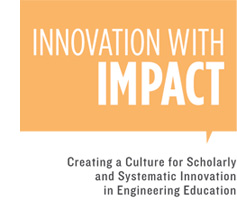Back
Back
Back
Back
Back
Dear Colleague:
 This report represents the culmination of a series of evolving conversations that began in the summer of 2004 within the American Society for Engineering Education and that progressively broadened to include hundreds of engineering faculty, chairs, and deans across the United States. The initial conversations focused on how the Society could and should contribute to the national dialogue on preparing U.S. engineers for the twenty-first century. As a consequence of those conversations ASEE launched in June 2006 an initiative, “Advancing the Scholarship of Engineering Education: A Year of Dialogue,” involving discussions within the Society on the role and importance of educational scholarship to ensure the long-term excellence of U.S. engineering education. A report based on those discussions led to this project, which began in October 2007 with support from ASEE and the National Science Foundation. The project sought to catalyze even broader conversations across the American engineering enterprise on creating a vibrant engineering academic culture for scholarly and systematic innovation to ensure that the U.S. engineering education enterprise keeps pace with changes in the engineering profession and in the world.
This report represents the culmination of a series of evolving conversations that began in the summer of 2004 within the American Society for Engineering Education and that progressively broadened to include hundreds of engineering faculty, chairs, and deans across the United States. The initial conversations focused on how the Society could and should contribute to the national dialogue on preparing U.S. engineers for the twenty-first century. As a consequence of those conversations ASEE launched in June 2006 an initiative, “Advancing the Scholarship of Engineering Education: A Year of Dialogue,” involving discussions within the Society on the role and importance of educational scholarship to ensure the long-term excellence of U.S. engineering education. A report based on those discussions led to this project, which began in October 2007 with support from ASEE and the National Science Foundation. The project sought to catalyze even broader conversations across the American engineering enterprise on creating a vibrant engineering academic culture for scholarly and systematic innovation to ensure that the U.S. engineering education enterprise keeps pace with changes in the engineering profession and in the world.
The project was conducted in two phases. Phase 1 involved the efforts of sixty-eight volunteers who worked for more than six months to distill their thoughts and recent articles and reports into a set of critical issues and actions to advance U.S. engineering education. These were shared and discussed with another thirty-seven volunteers at a meeting in November 2008 in Atlanta, Georgia. The advice and ideas from that meeting were incorporated into the report, “Creating a Culture for Scholarly and Systematic Innovation in Engineering Education,” which was presented at the main plenary at the ASEE annual conference in June 2009 and posted on the ASEE Web site (www.asee.org).
Immediately following that conference, Phase 2 was launched to seek additional advice and ideas from the broader U.S. engineering community on the critical issues and suggested actions in the Phase 1 report. The project’s research team prepared and conducted a survey of a large sample of U.S. engineering programs to gather feedback and to establish a baseline on current practices in engineering education. This was supplemented by written feedback collected following the presentation of the report at a number of conferences and meetings over a two-year period. The feedback was analyzed, combined with the highlights of the Phase 1 report, distilled into seven recommendations and over 70 potential actions generated during the course of the project, and this final report prepared.
As reflected in the report title, we believe that there is an opportunity to foster a culture of innovation with impact. On behalf of all of those who contributed their time and energy to this project, we hope this report provides new ideas and timely inspirations to help make our world-class engineering programs even better—and to continue to evolve engineering education as a vibrant, high-performance, effective, efficient, collaborative, rigorous, and valued endeavor that is responsive to the changing needs of the profession and the world.
Sincerely,
Leah H. Jamieson, the John A. Edwardson Dean, College of Engineering and
Ransburg Distinguished Professor of Electrical and Computer Engineering
Purdue University
Jack R. Lohmann, P.E.
Vice Provost for Faculty and Academic Development and
Professor of Industrial and Systems Engineering
Georgia Institute of Technology